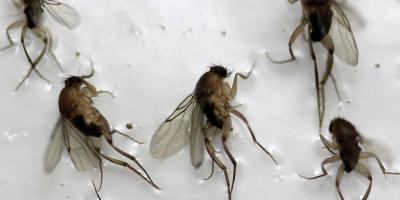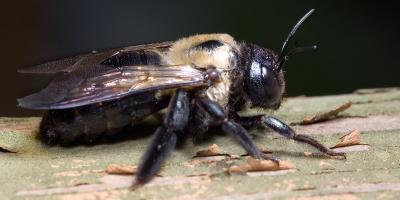Cicada Killers: All Buzz, No Sting

At over two inches in length, these black and yellow buzzers may look menacing, but unless you’re a cicada, these particular wasps are practically harmless. Known as “cicada killers,” Sphecius speciosus are a type of wasp that preys solely on dog-day cicadas (named for the “dog days of summer” during which they appear).
However, even though they are extremely unlikely to sting you, cicada killer wasps can still be a major pain in other ways.
Catching Up with Cicada Killers
Cicada killer wasps hunt their namesake prey to provide food for their hatching larvae. First, the female wasps burrow into the ground, preferring sandy soils over well-kept, healthy lawns, to create their little nurseries.
This can be a particular disruption to brick patios and other backyard structures laid on sand, as well as vegetable gardens and flower beds, where the burrowing insects can disrupt root systems.
Once their nest is dug, the mothers-to-be go out in search of cicadas, which they paralyze with an injection of toxin and bring home to their new underground lair.
Yes, that means they are capable of stinging, but no, you don’t have to worry—unlike many other species of hornets and wasps, cicada killers will not sting humans unless excessively provoked.
They do, however, pose a slight risk for pets, as becoming trapped in a playful dog or cat’s mouth certainly qualifies as “excessively provoked,” and they will sting an animal’s cheek or tongue to get out of such a predicament.
The males of the species are more territorial and will attempt to intimidate and thwart perceived threats. Once they map out an area they believe is the perfect spot to attract females, they defend it vigorously.
However, oddly enough, males are not equipped with stingers; all that posturing is for naught, even though they may “pretend” to sting as part of their ruse.
Once her prey is captured, the female wasp then buries the cicada in her subterranean tunnel and lays eggs under the cicada’s legs. As those eggs hatch, the larvae feed on the live, yet still paralized cicada until they become large enough to spin a cocoon and become adult wasps themselves.
A Summertime Cacophony
If you happen to be a fan of the distinct “music” performed by summertime cicadas (theirs is the loudest mating call among insects), fret not: cicada killers only prey on dog-day cicadas, which leaves the other broods free to sing the night away. However, cicadas are considered a nuisance pest, making cicada killers beneficial wasps as far as most folks are concerned.
Even if you’re rather enamored of the thumb-sized noisemakers (that look like overgrown horseflies), seeing a much smaller wasp flying her big cicada catch back to the nest is quite a sight to behold.
It’s not always easy to tell the difference between cicada killer wasps and their more dangerous (to humans, anyway) cousins. In fact, a public library in Cold Spring, Kentucky once mistook cicada killers for the far more deadly Japanese hornets, prompting them to put out orange cones and caution tapes until they realized their blunder. But luckily, most of us are capable of checking online for ID tips in cases where it could be necessary.
Not sure whether you’re looking at a cicada killer or not? Send a picture to Dr. Gary for a free identification.



